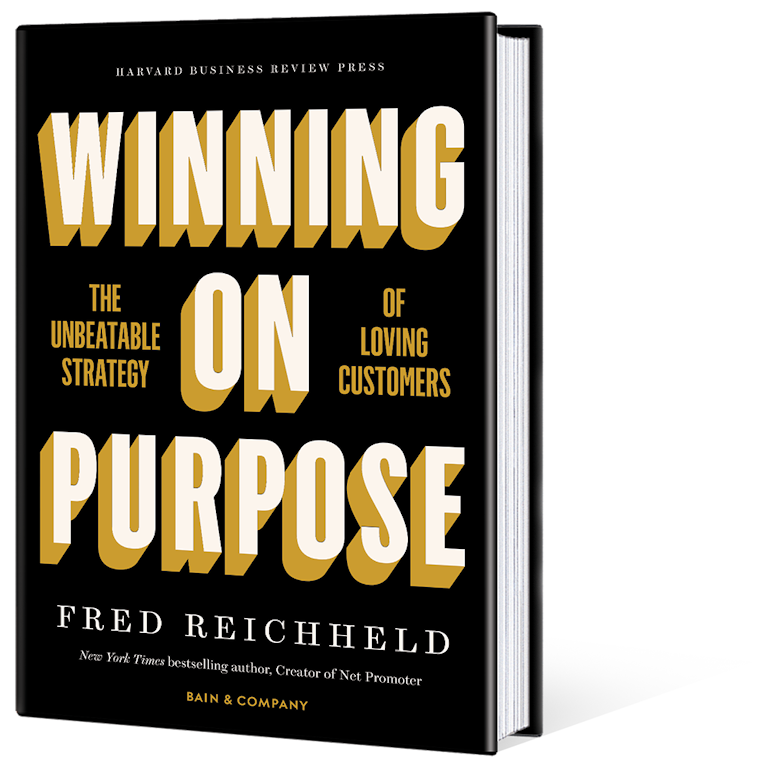The Customer Confidential Podcast
Go Big, or Go Home: Understanding the Power of “Big NPS”
Companies that think bigger about NPS hold the key to lasting customer happiness, says Fred Reichheld.
The Customer Confidential Podcast
Companies that think bigger about NPS hold the key to lasting customer happiness, says Fred Reichheld.

You can listen to this episode and others on Apple Podcasts, Spotify, Stitcher, or your podcast provider of choice.
It seems obvious enough: When customers feel loved and appreciated by a company, they stay longer, buy more, and enthusiastically return. But the actions and initiatives required to make customers feel this love can often be a hard sell to boards and shareholders. How do you get them to abandon quick profits and invest in the long-term goal of customer satisfaction?
In this episode of the podcast, Fred Reichheld, a Bain fellow, creator of the Net Promoter System, and author of the new book Winning on Purpose: The Unbeatable Strategy of Loving Customers, shares how leaders should be using NPS correctly to succeed in the long run.

This new book by Fred Reichheld, Darci Darnell, and Maureen Burns demonstrates that great leaders embrace a higher purpose to win, and Net Promoter® shines as their guiding star.
Fred describes two kinds of NPS: “big NPS,” in which leaders focus on crafting and instilling a strong sense of purpose centered on enriching customers’ lives, and “little NPS,” which revolves around the technical and granular day-to-day execution of the nuts and bolts of the Net Promoter System (when to ask for feedback, how to ask, how to do the analytics, how to execute follow-up calls, and the like). “Little NPS,” though essential and valued by leaders for its ability to generate near-term results, limits management and employees from embracing a customer-centric view, Fred says.
“Way too much of our time and energy has been focused on ‘little NPS’—the specific, detailed technology. For example, do you put 10 through zero or zero through 10?” Fred says. “Not to diminish the importance of getting all that stuff right, but ‘big NPS’ has to be in place before ‘little NPS’ can really have much impact.”
Leadership teams that don’t have a customer-first mindset or that don’t make it a priority to inspire their teams to embrace a higher sense of purpose—namely, loving your customers—won’t get very far with the technical aspects of NPS. If leaders are investing in “little NPS,” it should be because they’re focused on the bigger goal of creating a valuable customer base.
And while focusing on ”little NPS” might generate near-term results that satisfy shareholders and boards, Fred says not investing in “big NPS” strategy risks undermining customer relationships and losing out on value for long-term shareholders.
“The economics of loyalty and love all come down to the idea that if I can get one thing right, customers feeling the love so they come back for more and bring their friends and refer us,” Fred says, “that little flywheel explains why this is a logical and a winning strategy.”

Customer love blooms with purpose-driven leadership. Meet some of the executives inspiring their teams to lead with love.
In the end, incorporating NPS—“big” or “little”—relies on leaders finding their winning purpose and providing customers with as much love and care as they can offer. That’s what customers truly deserve.
In this episode, the final episode of my series with the authors of Winning on Purpose, you can hear Fred and I discuss why “big NPS” will contribute to long-term customer satisfaction and happiness.
Learn more about Winning on Purpose and order a copy here.
In the following excerpt, Fred and I discuss his hopes for the future of NPS, both “big” and “little.”
Rob Markey: What do you hope the impact of your work is 5 or 7 or 10 years down the road?
Fred Reichheld: I would like to see businesses measuring success differently and to have financials seen as the constraint as opposed to the objective to maximize—and customers no longer thought of as the constraint. The whole language of customer satisfaction is the language of constraints.
We owe the maximum duty of love and care and everything innovative to make life better for customers. That's what they deserve. And I'll know that's happening when people start investing in NPS insights and when I see more firms gathering earned growth rate data, reporting it to their board, and eventually reporting it in an audited form to the world of investors.
And I'll know it just in my daily life, because I'll stop having these horrible policies of bad profits slapping me in the face everywhere I go.
We have so much to fix. And I think we all need to be a little bit more understanding and demanding to fix things that are obviously wrong.
Rob Markey: Well, Fred, that hopeful note, that we can actually address some of the short-term/long-term trade-offs, that we can find ways to make life better for our customers and our colleagues, thank you.

Explore more episodes of The Customer Confidential Podcast.